When interacting with and storing cryptocurrencies, there are a variety of wallet options available in the market. These range from centralized exchanges offering custodial wallets, to fully decentralized self-custody wallets whereby the user is the sole gatekeeper of their crypto assets.
Here, we will discuss the various options and cover the 7 best ERC20 wallets that are available in 2024.
Our Picks of the Best ERC20 Token Wallets in 2024
- eToro: eToro is a broker exchange platform, with a background primarily in stocks and ETF trading products. More recently, eToro has expanded its operations to the world of cryptocurrency. This platform allows users to trade over 20 crypto assets, with storage available either on the exchange or in their proprietary eToro Money Wallet.
- Coinbase: One of the most popular crypto exchanges, Coinbase provides users with a self-custody wallet that stores hundreds of cryptocurrencies, can connect to dApps, and is used to store and manage NFTs. Coinbase provides top-grade cryptographic security and supports tokens from multiple blockchains including Bitcoin, Solana, Binance, Optimism, and a range of Ethereum ERC20 coins.
- Kraken: Kraken is a top-tier centralized exchange that provides a custodial wallet for users to view, manage, and store their digital assets. The platform ensures that private keys and funds are securely stored with the highest-grade encryption.
- Paybis: A fiat on-ramp platform that allows users to buy and sell cryptocurrencies either with or into fiat currencies. Paybis facilitates the onboarding of fiat currency such as US Dollars and offers multiple payment methods. The platform provides users with a multi-chain crypto wallet to securely store various blockchain project tokens built on the ERC20 network.
- Best Wallet: Best Wallet is a decentralized, multi-chain, self-custody crypto wallet with added features for market insights, airdrops, and token watchlists. The platform also offers secure login with 2FA.
- Zengo: Zengo is a unique crypto wallet in that it doesn’t carry the risks of seed-phrase vulnerability. Zengo uses next-generation security that leverages MPC cryptography and 3FA for secure recovery of crypto assets in case of forgetting log-ins.
- Ledger: Ledger is the ultimate off-chain cold storage device that completely stores crypto in a secure offline environment. Although slightly more difficult to manage, it provides top-notch security when storing ERC20 tokens and other cryptos. It is one of the most popular cold storage hardware wallets in the crypto sector.
A Closer Look at the Best ERC20 Compatible Wallets
As mentioned above, there are several top ERC20 crypto wallets on the market, each having varied properties, features, and functionality. In addition, some of these wallets are custodial, while others are self-custody, hybrid, or cold storage hardware devices.
Below we will cover the best ERC20 wallets in greater depth
1. eToro: Secure Hybrid Wallet Allowing Storage, Transfers, Sending and Receiving of Multiple Cryptos
eToro is an exchange brokerage platform that allows users to trade cryptocurrency and a range of other traditional asset classes. The platform boasts a 30-million strong user base, and is one of the most popular platforms for novice crypto users.
In the U.S., eToro offers users the possibility to buy and sell 21 different cryptocurrencies, including ERC20 tokens such as Ethereum, Chainlink, and Basic Attention Token. Users can store the supported cryptos either on the exchange or in the eToro Money Wallet.
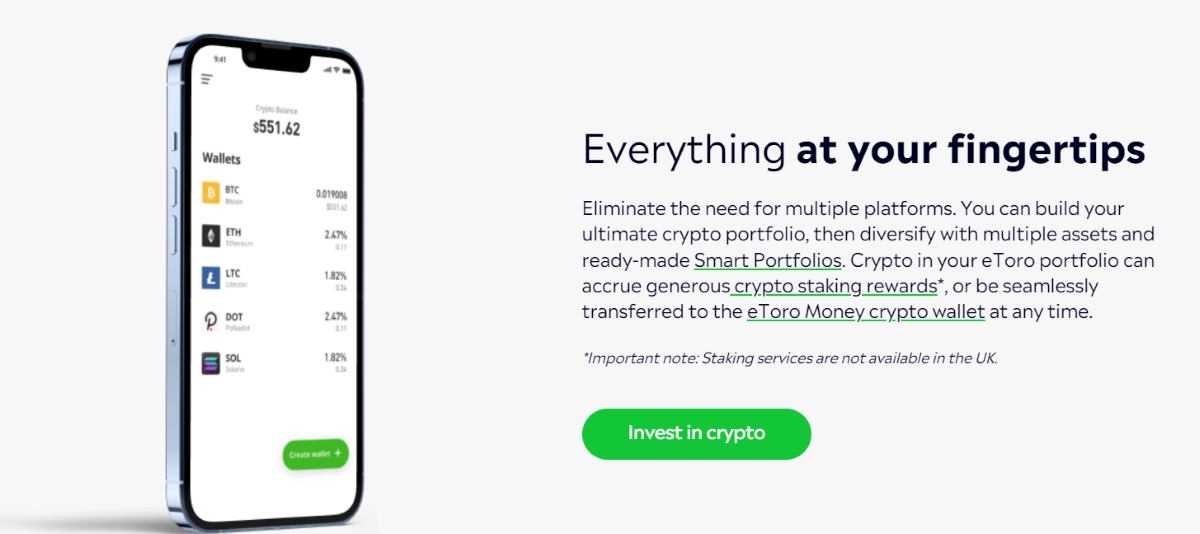
The eToro Money Crypto Wallet is a hybrid wallet that has the benefits of self-custody wallets, along with the added security of custodian wallets.
Before downloading an eToro Money Wallet, users will need to first have an eToro account. This allows secure login via a simple username and password, without the need for a private key or the technical know-how of cold storage wallets. The method also eliminates the potential risk of losing a private key or seed phrase, which ultimately will leave a user’s wallet inaccessible and can lead to loss of funds.
One drawback of the eToro Money Wallet is that it only supports eight different cryptocurrencies. These are: Bitcoin, Bitcoin Cash, Cardano, Ethereum, Litecoin, Stellar, Tron, and XRP.
Pros
- Support for thousands of cryptocurrency tokens
- Most popular crypto platform in the industry
- Assurance of security and protection through stringent auditing
Cons:
- No desktop application; only browser extension or mobile
- eToro Money Wallet only supports eight tokens
- Must have an eToro account to obtain a wallet
2. Coinbase: Best ERC20 Compatible Crypto Wallet With Extensive Security and Added Protection Features
Coinbase is one of the most popular cryptocurrency exchange platforms in the web3 industry, providing users with one of the best ERC20 wallet apps in the sector. Coinbase is regulated across multiple jurisdictions, offering top-grade encryption and added layers of security to keep users’ assets safe and secure.
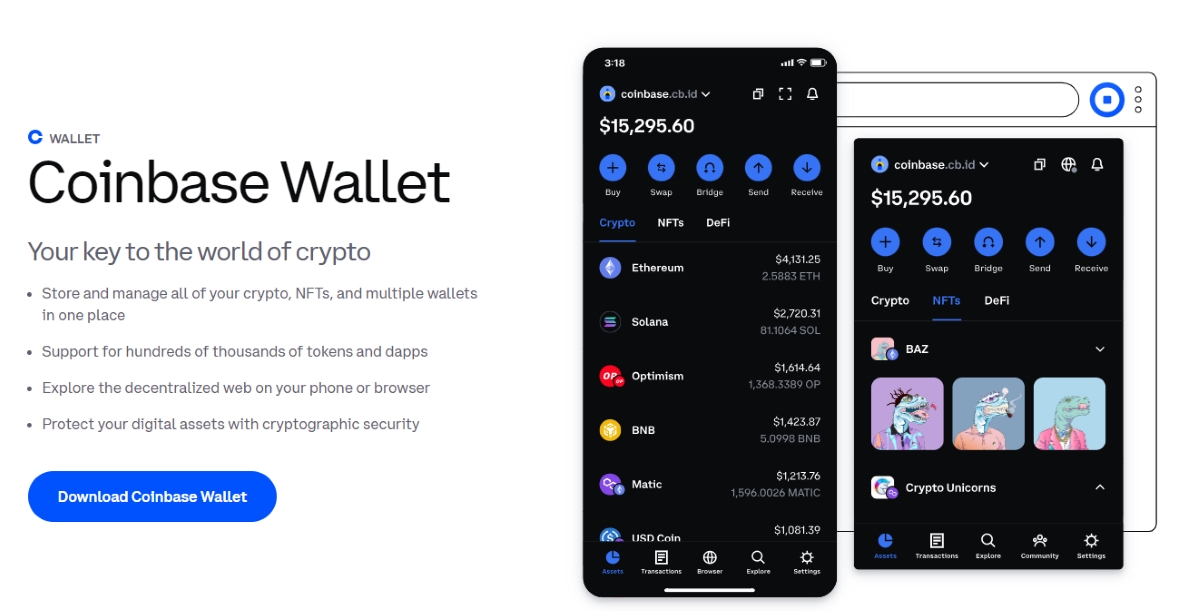
Coinbase is one of the only crypto native exchanges that is publicly listed on the NASDAQ stock exchange. This means that the platform must undergo strict audits to ensure their funds and reserves are proven through untampered accounting in a monitored and controlled environment.
The platform offers users the option to store ERC20 tokens and other crypto assets directly on the exchange. Alternatively, users can opt for the proprietary Coinbase Wallet, which is a self-custody wallet that allows crypto investors to take full control of their crypto and private keys.
The Coinbase Wallet also boasts industry-leading security with added features such as transaction transparency, which provides token approval alerts and previews. This helps to prevent users from interacting with malicious dApps and smart contract vulnerabilities.
Using the Coinbase Wallet allows users to navigate the world of web3, being able to connect to thousands of dApps including decentralized exchanges, lending protocols, DeFi apps, GameFi products, and NFT marketplaces. Users looking to invest in new projects can also utilize the Coinbase Wallet to participate in some of the best upcoming crypto presales.
Pros
- Support for thousands of cryptocurrency tokens
- Most popular crypto platform in the industry
- Assurance of security and protection through stringent auditing
Cons:
- No desktop application; only browser extension or mobile
- Potential for high fees
2. Kraken: Top-tier Crypto Exchange and Secure ERC20 Token Custodian
Kraken is a renowned cryptocurrency exchange, long recognized as being secure and safe. While not the most popular platform on the market, it bolsters all-star security and custodian services for its user base.
Kraken offers users the opportunity to buy, sell, and trade over 200 different crypto assets across multiple blockchains including Ethereum, Solana, Avalanche, and Polygon Matic.
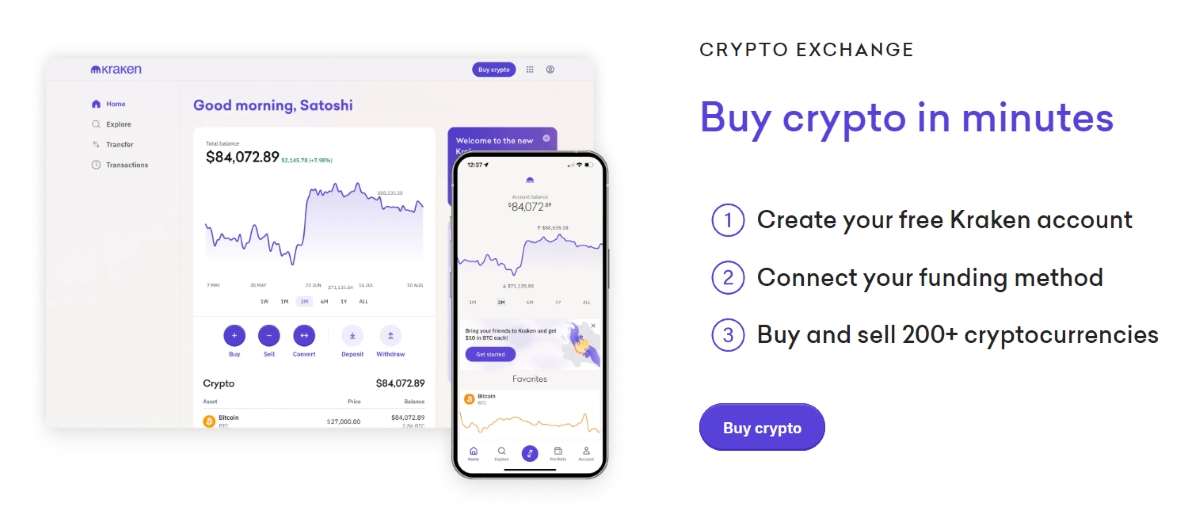
It also offers users the possibility to convert in and out of seven different fiat currencies, which include USD, CAD, EUR, GBP, JPY, CHF, and AUD.
Despite Kraken describing itself as “not a wallet service”, the platform does incorporate a few notable security measures to ensure user funds are handled and stored safely and securely. This includes client funds being stored in Kraken’s corporate wallet for safeguarding while funds are being exchanged, used for trading, or staking.
Well-established crypto exchanges use a mixture of cold storage and hot wallets in their operations. Kraken separates the deposit and withdrawal wallets ensuring minimum exposure and hacking vulnerability. It reduces the risk of its wallets being exploited by making the sending address for withdrawals different than the deposit address.
Kraken is another cryptocurrency exchange platform that undergoes stringent audits and must provide data on its reserves. You can check out the Kraken Proof of Reserve Summary for a detailed breakdown of this.
Pros
- Globally renowned cryptocurrency exchange
- Supports seven fiat currencies and can off-ramp crypto to fiat
- Mixture of hot wallets and cold storage for custody
Cons:
- Cannot interact with web3 dApps and protocols
- Unable to stake tokens elsewhere
- No hybrid self-custody wallet was introduced
3. Paybis: A Custodial ERC20 Compatible Wallet with On-Chain Verification
Paybis is a custodial wallet provider that supports multiple blockchain tokens including Bitcoin, Ethereum, Solana, and Litecoin.
The platform offers users a secure and easy way to store, access, and manage cryptocurrency holdings. Users’ wallets will be directly attached to their Paybis account and funds are held in custody by Paybis itself.
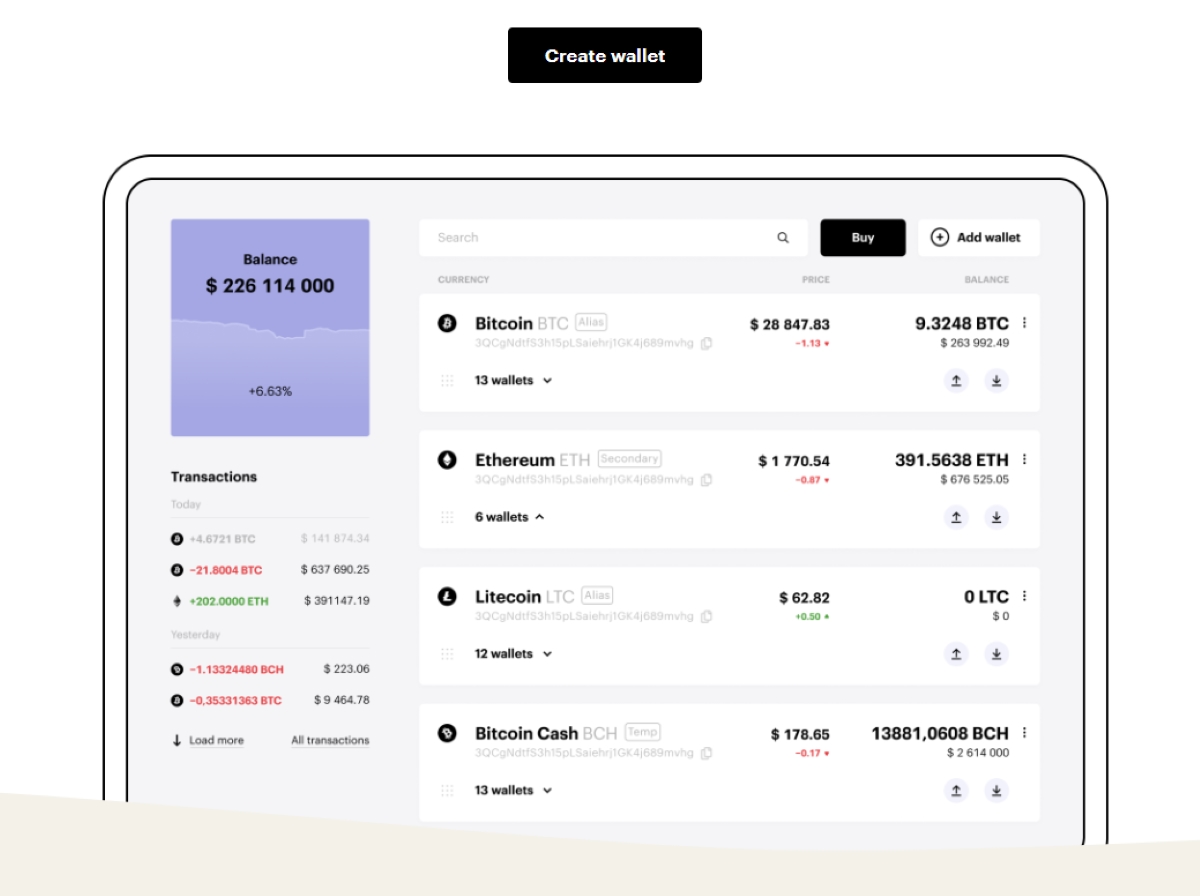
The platform incorporates the MPC (multi-party computation) model which gives users enhanced security and peace of mind that their ERC20 cryptos are stored safely. The MPC model eliminates the need for securely writing down and storing a private key, as this method ensures that the private key is fragmented and stored independently from other data. Although this does allow for convenience in accessing funds, using custodial wallets on exchanges still poses risks – for instance, if the exchange goes offline, users will not be able to access their funds.
However, there are some factors to consider that create a sense of reliability and oversight of the platform. Firstly, Paybis is a licensed Money Service Business, registered with the FinCEN Department of the US Treasury. Owning this license requires Paybis to provide sound accounting information and undergo regular audits.
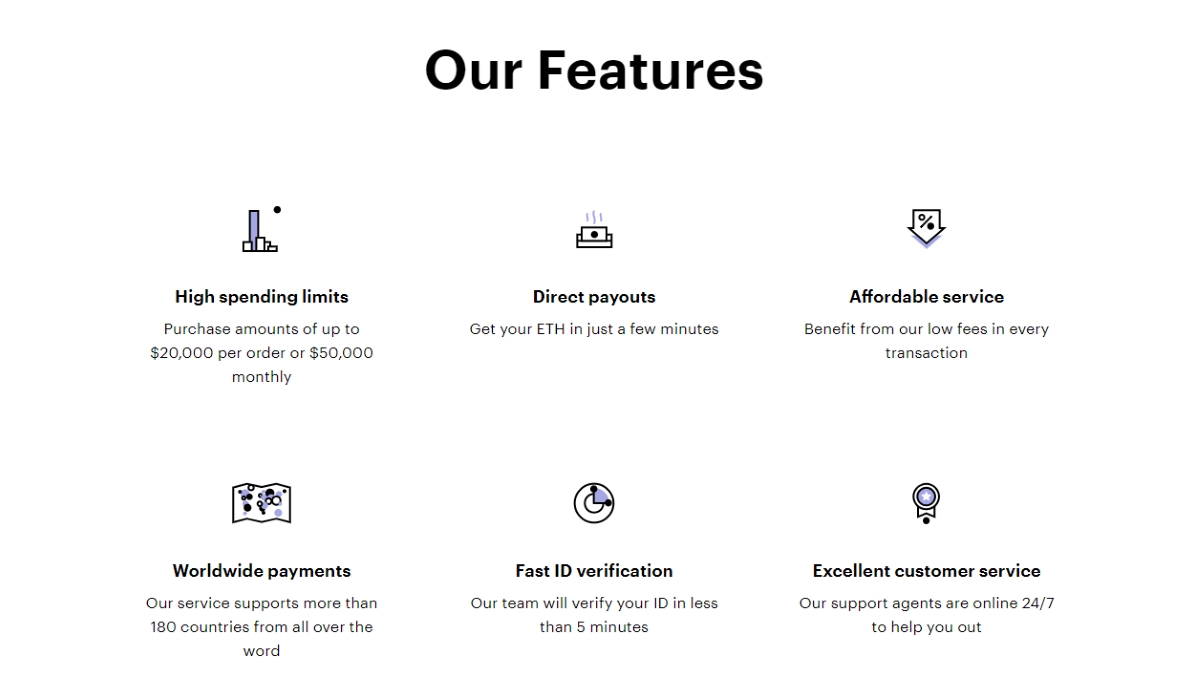
The platform eligibility covers more than 180 countries and 48 US states, which means that users can buy and sell crypto from most countries around the world without restrictions.
Pros
- Worldwide access to buy and sell crypto
- No need for private key worries
- Direct fiat on and off ramps
Cons:
- Limited number of tokens supported
- Each blockchain’s tokens need a separate wallet
4. Best Wallet: Brand New and Full of Features
Best Wallet is a new cryptocurrency wallet launched in 2023 and is a direct competitor to popular non-custodial wallets such as Trust Wallet and MetaMask.
Best Wallet functions similarly to any self-custody wallet, putting ownership and responsibility of crypto assets in the hands of the user. It is a multi-chain, multi-wallet app with added features such as in-app swaps, fiat payment gateways, and Web3Auth Integration.

Best Wallet also bolsters added security features, incorporating biometric security with a passcode, login, and 2-factor authentication. Moreover, the platform is currently in phase three of development, which will introduce a token launchpad, fiat off-ramp capabilities, a token explorer, and an airdrop hub.
Key highlights to mention are the ‘upcoming tokens’, allowing users to find some of the best crypto ICOs, in addition to a ‘token airdrops’ section which allows users to immediately conduct tasks and participate directly within the app.
Best Wallet will also introduce a ‘trending tokens’ section that provides market insights and alpha on tokens that are hot in the market or have recently seen positive price and buy action.
Pros
- Range of added features makes it an all-in-one wallet app
- Both fiat on and off-ramp capability
- Find market insights and alpha on tokens, presales and airdrops
Cons:
- Not all features are fully launched
- Very new wallet app so unable to fully evaluate features
5. Zengo: Multi-Chain Self Custody ERC20 Crypto Wallet. No Seed Phrase Vulnerability
Zengo is a multi-chain self-custody crypto wallet that incorporates high levels of security. Crucially, it has no seed phrase vulnerability due to using (MPC) multi-party computation cryptography. This method provides bulletproof security against phishing scams and hacking attacks, preventing account takeovers by securely storing the private key on fractionalized secure servers.
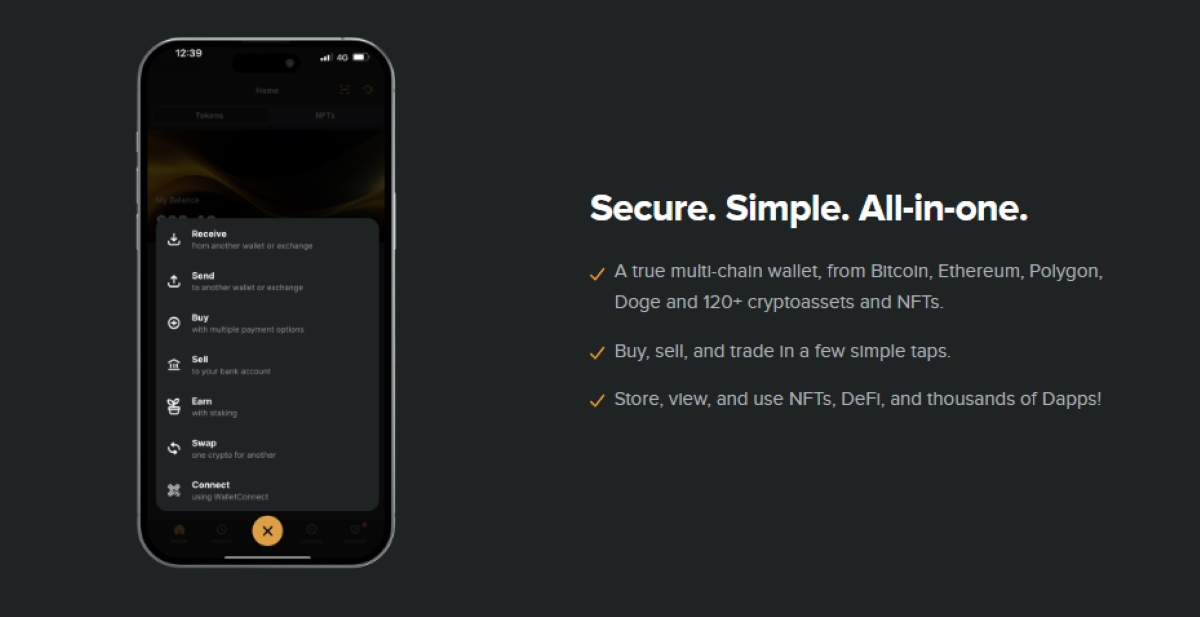
Zengo has also introduced 3-factor authentication, ensuring that an account is always recoverable by validating a user through the email account, 3D FaceLock (an encrypted biometric scan), and the Zengo recovery file.
The platform also implements Legacy Transfer which allows users to nominate a friend or family member to receive their assets in the event of their death.
Zengo supports a wide range of cryptos including all the most popular ERC20 crypto tokens, as well as Ethereum layer 2 tokens hosted on Polygon, Arbitrum, and Optimism.
One drawback of the Zengo wallet is its limited support for other blockchains that are not related to Ethereum such as Binance Chain, Tron, Base, and other layer 2 protocols.
Pros
- Highest levels of security with MPC and 3FA technology
- Web3 firewall provides alerts and protection against attacks
- Supports 120+ crypto assets
Cons:
- Lack of support for other blockchain tokens
- Only available on mobile – no desktop app or extension
6. Ledger: Secure Device Holding Crypto Assets Offline in Cold Storage
Ledger, being a hardware wallet that does not connect to the internet, is one of the best and most secure ERC20 wallets available. This type of wallet is called a hardware wallet or cold storage device, providing the safest and most secure way to hold ERC20 tokens and multiple other blockchain cryptocurrencies.
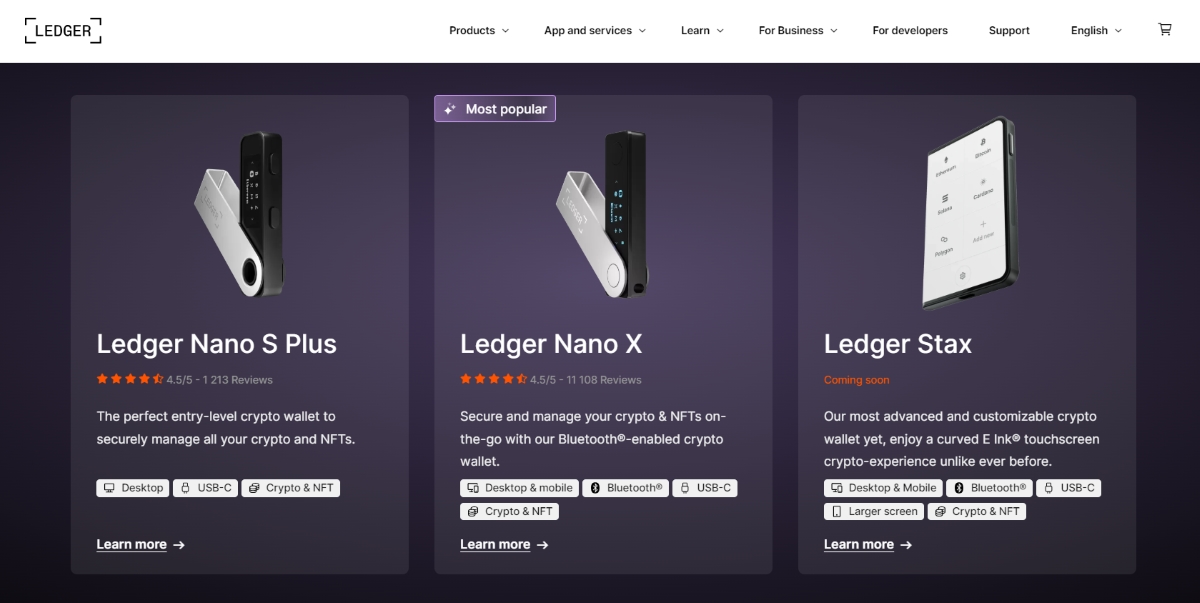
The product itself is a simple USB stick with a small digital screen used for entering the access code and viewing transfer statuses. Simply put, Ledger is the best option for anyone wishing to store and hold their crypto tokens long term, without the desire of swapping, trading, or transferring them out of storage for extended periods.
In order to access the Ledger wallet, users must connect it to their computer and ledger account. They will then be prompted to enter a unique seed word. The seed phrase is randomly generated when the device is first configured, and must be written down and safely stored away by the user.
In case of loss or damage to the Ledger device itself, users will be able to purchase a new ledger and use their existing credentials to access their funds.
Cold storage hardware wallets are the most secure method to hold cryptocurrencies, where the only drawback is if wishing to sell or trade assets, a transfer will be needed every time to send the tokens out to an exchange or external hot wallet.
Pros
- Crypto assets are stored fully offline and off-chain
- The most secure way to secure and hold cryptocurrencies
- Access funds from any ledger device with the seed phrase
Cons:
- Buying from third parties is risky as they can tamper with the device
- Less convenient if regularly trading cryptos
The Basics of ERC-20 Wallets
Generally, crypto wallets can be difficult to comprehend. With this in mind, we will now cover some of the fundamentals of ERC20-compatible wallets.
What is an ERC20 Wallet?
An ERC20 wallet is a digital wallet used to store your crypto holdings. They are primarily used for storing cryptocurrency tokens that are built on the Ethereum blockchain.
‘ERC20’ refers to the token standard, which has been adopted by other blockchain protocols. Some others include TRC20 (Tron), BEP20 (Binance Chain) and BRC20 (Ordi).
What differs in ERC20 wallets from a typical multi-currency bank account is that users will be provided with one address to which all tokens can be sent. Most non-custodial wallets function in this way, and all ERC20 standard tokens can be safely sent, transferred, and stored on them.
How do ERC20 Wallets Work?
ERC20 wallets operate similarly to a bank account, with the primary difference being that you are the sole gatekeeper. This is crucial to understand before creating your first ERC20-compatible wallet.
In the crypto world, a common phrase is “not your keys – not your coins”. This is because one of the fundamentals of blockchain architecture is self-governing responsibility over your assets, unlike a bank. With ERC20 crypto wallets, only you physically have the access keys.
When creating an ERC20 wallet you will be given one primary public address. This address is like your bank account number, commonly referred to as a wallet address. This wallet address will be unique to you.
According to CoinTelegraph, an Ethereum address is “simply a public string of letters and numbers starting with 0x”.
Advantages of using an ERC20 wallet
There are several advantages to using an ERC20 wallet. Firstly, they provide a secure and safe way to hold your crypto holdings. Users can easily manage several tokens owned in a portfolio, trade them instantly, conduct crypto-to-crypto swaps, and stake their crypto while securely storing their tokens.
With some ERC20 wallets that are non-custodial, such as BestWallet, users can interact with a variety of decentralized applications (dApps) to use lending protocols, access decentralized exchanges to trade in DeFi coins, connect to NFT marketplaces. and participate in popular play-to-earn games which can earn extra rewards and more crypto.
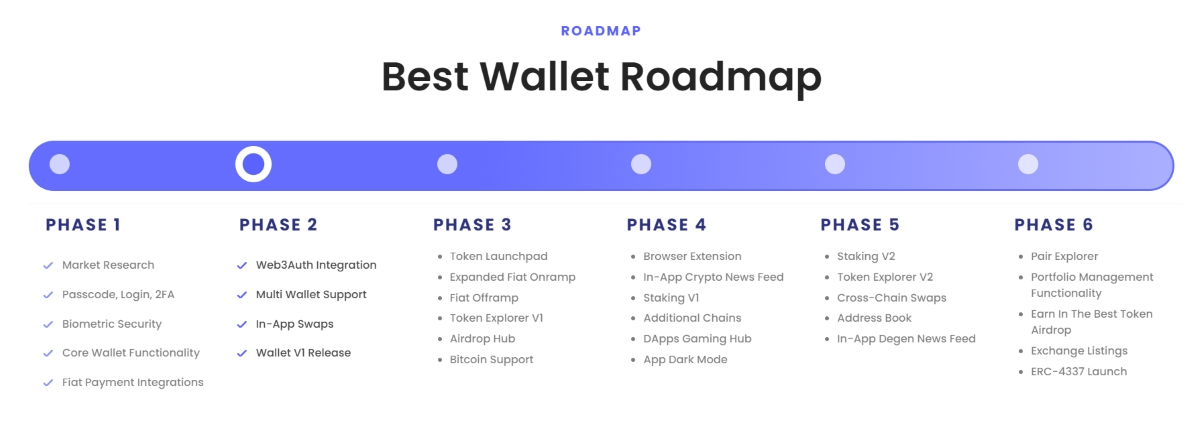
One play-to-earn game that is set to be launched soon is Meme Kombat, which users will need to connect to using a compatible ERC20 wallet. It has the potential to become one of the best meme coins in the market, however, it is mandatory to have an ERC20 wallet to interact with the dApp.
Do you need an ERC20 wallet in 2024?
The cryptocurrency niche has experienced immense growth in the last few years, with people increasingly looking at crypto as a means of not just investment, but payment too. Therefore, to have a suitable way in which to store cryptocurrency, users will need to own an ERC20-compatible wallet.
Users should consider how often they are looking to trade, transfer, and interact with their cryptos to figure out which is the most suitable wallet to use for storage. This is because custodial wallets such as Kraken are technically exchanges, with private keys and funds being stored on your behalf by this trusted third party.
However, it is essential to opt for a trusted, centralized exchange when using custodial wallets.
This is to avoid any loss of funds and to be confident that the exchange is managing its balance sheet and treasury correctly.
This is particularly important in light of the recent collapse of FTX. It ultimately emerged that the exchange was conducting double accounting and not correctly managing its treasury funds, which ultimately led to its bankruptcy. Therefore, it is essential to use well-established custodial exchanges to ensure the safety of funds.
How to Find and Use an Ethereum Wallet
Finding the right Ethereum wallet can be a tricky task. With so many available options, users will want to consider the various strengths and weaknesses behind each one. This includes factors such as the security levels, added features, blockchain token compatibility, trustworthiness, and reputation of the platform.
Below, we will outline some key steps that will assist users on their journey to creating their first ERC20-compatible crypto wallet.
1. Choose a wallet that matches your preferences
Firstly, users must select which wallet they would like to use. Our expert review panel opts for the eToro Money Wallet for someone just getting started. This is a hybrid wallet that combines the features of a self-custody wallet along with the added security of a secure trustworthy custodian.
This will also help users learn about how crypto wallets function, how transfers work, how to do crypto swaps, and how to get accustomed to the deposit and withdrawal address format.
2. Download the mobile app and create an account
To begin the process, you will need to download the eToro mobile application and create an account. eToro will ask for identity verification and proof of address which is a standard process for most mainstream crypto exchanges nowadays.
Once you have uploaded your KYC documents, eToro will need a few hours until they approve your account.
The next step will be to navigate to the eToro Money Wallet section on their website and download the eToro Money App which is only available on mobile IOS and Android.
3. Deposit or purchase a supported ERC20 token
The next step is to deposit some funds. Simply navigate to deposit funds on eToro Money App and enter the amount you wish to deposit. eToro only supports payments via debit card (minimum $20), or users can manually conduct a bank transfer, but the minimum deposit for this method is $500.
Once your deposit has appeared in your wallet, you can now directly purchase any supported crypto from within it. Navigate to the token you wish and select the buy option. Enter the amount you wish to purchase, review your transaction details, and confirm the steps that follow.
Your crypto purchase should now be complete, and you will see the balance updated in the account balances section. You can now either transfer your Ethereum out from the wallet, or transfer it to eToro’s trading platform to either sell or trade.
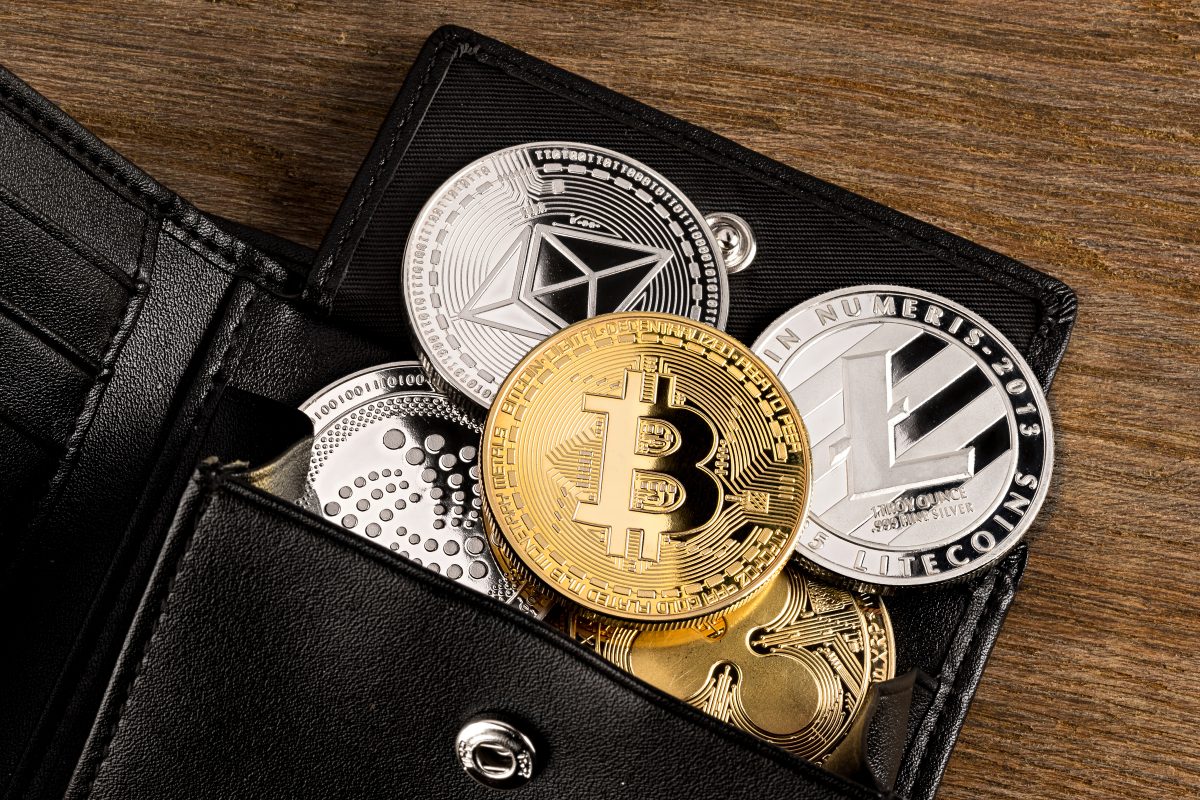
Our Verdict on the Best ERC20 Coin Wallets in 2024
Though a competitive marketplace our expert review panel has selected eToro as the best ERC20 wallet. Quite simply, eToro has found a balance between decentralization and secure centralized custody, which ensures that inexperienced crypto users can still be interacting and storing their tokens securely, with an added layer of security.
eToro is a trusted custodian and has trading operations worldwide, being regarded as a top-level financial brokerage platform. The hybrid model gives the best of both worlds, allowing users to manage their funds securely while having the extra safeguard and oversight of eToro.
Methodology – How we rate and review the best ERC20 wallets
When rating and reviewing the best ERC20 crypto wallets, we ensure that views are factual, unbiased, and presented from an objective perspective. We select an expert review panel of up to 10 members that will spend several hours exploring each wallet app.
Some of the panel have limited or no experience with cryptocurrency, ensuring that opinions and views are equitable, fair, and unbiased.
FAQs
Which wallet is best for ERC20 tokens?
The best wallet to use is the eToro Money Wallet.
How do I get an ERC20 wallet?
To create an ERC20 wallet you must always visit the official website of your chosen provider. Download the extension or mobile app and follow the steps to create the wallet. You will need a pen and paper handy to write down your private key and seed phrase.
Is Coinbase an ERC20 wallet?
Coinbase itself is not an ERC20 wallet – it is a publicly listed crypto-focused business on the NASDAQ. Coinbase’s primary business is the Coinbase crypto exchange.
Does Best Wallet accept ERC20?
Yes, Best Wallet supports several blockchain token standards including ERC20 Ethereum network tokens.
References
- cointelegraph.com/learn/ethereum-wallets-a-beginners-guide-to-storing-eth
- https://www.reuters.com/technology/crypto-market-still-bears-scars-ftxs-collapse-2023-10-03/#:~:text=A%20jury%20in%20New%20York,he%20did%20not%20commit%20fraud
- widget.pro.ledgerlens.io/kraken-platform-spot-futures
- support.kraken.com/hc/en-us/articles/115006441267-Differences-between-a-crypto-exchange-and-a-crypto-wallet-service





